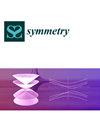Distributed Rotational Inertia Load Excitation Model and Its Impact on High-Speed Jointed Rotor Dynamic Response
IF 2.2
3区 综合性期刊
Q2 MULTIDISCIPLINARY SCIENCES
引用次数: 0
Abstract
Contemporary aero-engines aim for enhanced efficiency and weight reduction. They are designed to increase rotor operational speed while reducing rotor bending stiffness. This may result in bending deformation in rotor systems within the operational speed range. Such deformation can change the relative positions of rotor components, potentially causing increased mass asymmetry or unbalance. Traditional rotor dynamic models typically assume a constant rotor state. They approximate unbalance using constant mass eccentricities at certain rotor cross-sections. However, this approach has its limitations. This paper focuses on a high-speed jointed rotor system. A distributed rotational inertia load excitation model is proposed. This model explicitly considers the rotor’s variable unbalance state at different operational speeds. The study involves both simulations and experimental investigations. The results show that at high speeds, bending deformation causes the unbalance and rotational inertia load to shift from a concentrated to a distributed state. Notably, the localized rotational inertia moment from thin-disk components like turbine disks becomes significant at high speeds. This results in a rapid increase in bearing load with rotational speed. It also profoundly affects the rotor’s joints, causing interfacial slip and sudden changes in rotor vibration characteristics.分布式转动惯量载荷激励模型及其对高速关节转子动态响应的影响
当代航空发动机的目标是提高效率和减轻重量。它们旨在提高转子的运行速度,同时降低转子的弯曲刚度。这可能导致转子系统在运行速度范围内发生弯曲变形。这种变形可以改变转子部件的相对位置,潜在地引起质量不对称或不平衡的增加。传统的转子动力学模型通常假设转子状态恒定。他们近似不平衡使用恒定质量偏心在某些转子横截面。然而,这种方法有其局限性。本文主要研究一种高速关节转子系统。提出了一种分布式转动惯量载荷激励模型。该模型明确考虑了转子在不同转速下的变不平衡状态。这项研究包括模拟和实验调查。结果表明:在高速下,弯曲变形使不平衡和转动惯量载荷由集中状态转变为分布状态;值得注意的是,涡轮盘等薄盘部件的局部转动惯量在高速下变得显著。这导致轴承载荷随转速的快速增加。它还会深刻影响转子的关节,引起界面滑移和转子振动特性的突然变化。
本文章由计算机程序翻译,如有差异,请以英文原文为准。
求助全文
约1分钟内获得全文
求助全文
来源期刊

Symmetry-Basel
MULTIDISCIPLINARY SCIENCES-
CiteScore
5.40
自引率
11.10%
发文量
2276
审稿时长
14.88 days
期刊介绍:
Symmetry (ISSN 2073-8994), an international and interdisciplinary scientific journal, publishes reviews, regular research papers and short notes. Our aim is to encourage scientists to publish their experimental and theoretical research in as much detail as possible. There is no restriction on the length of the papers. Full experimental and/or methodical details must be provided, so that results can be reproduced.
 求助内容:
求助内容: 应助结果提醒方式:
应助结果提醒方式:


